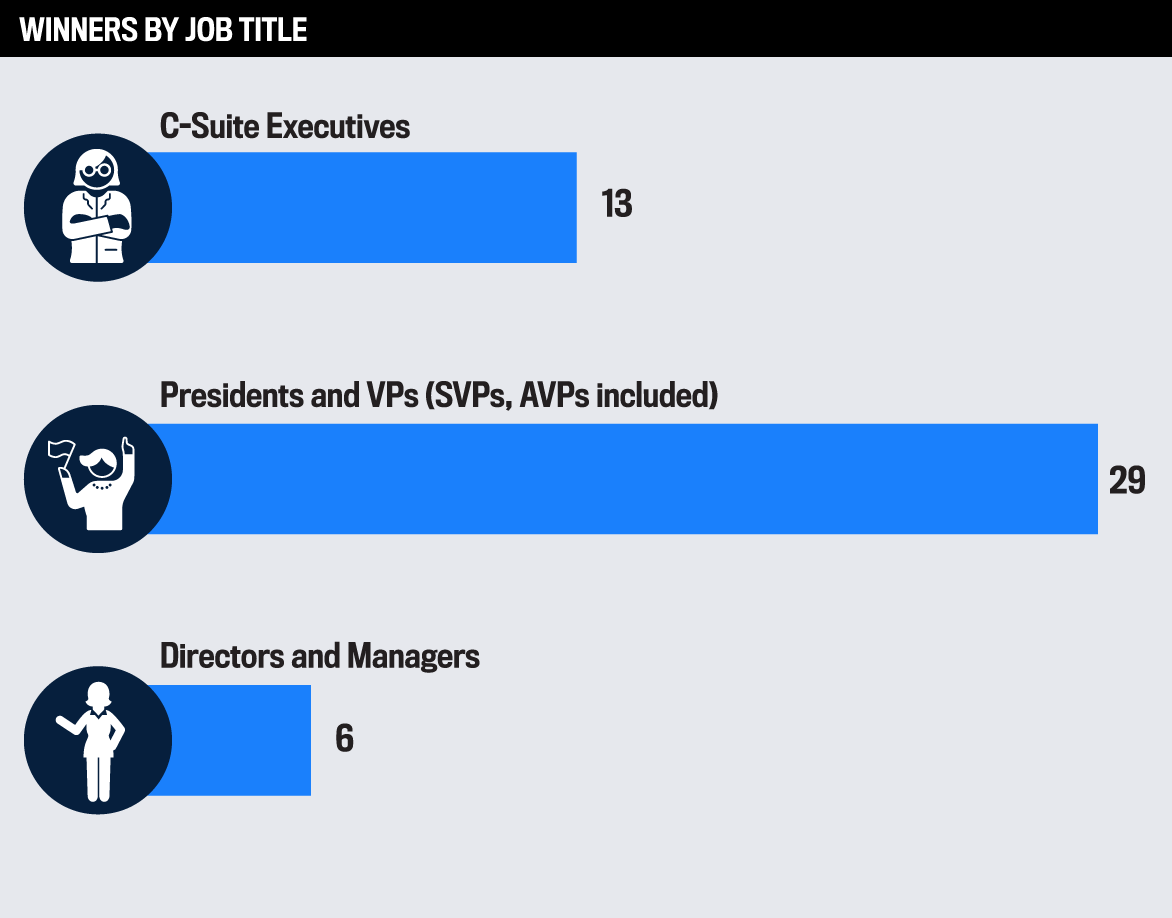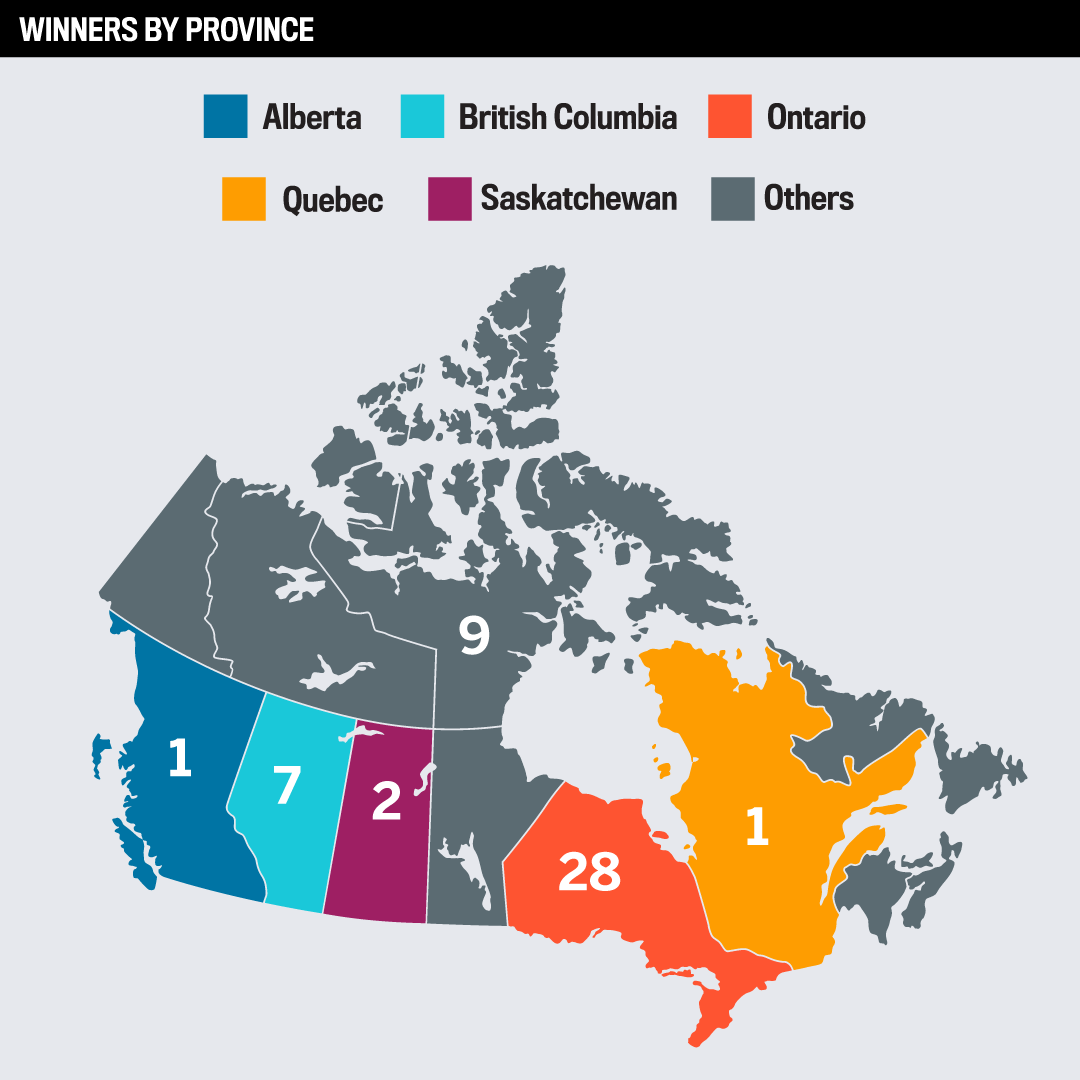
Elite Women 2022
Jump to winners | Jump to methodology
Navigating the maze
Canadian women have made great strides in their professional lives, but there’s still a long way to go toward true equality. Among women in their prime working years (aged 25–54), the employment rate has reached a record high of 81%, according to Statistics Canada. Currently, Canada ranks 24th out of 156 countries on the World Economic Forum’s Global Gender Gap Report. While there’s a wage gap of $0.10 for every dollar between full-time male and female employees, the Pay Equity Act, which took effect in 2021, mandates Canadian companies to create proactive plans to ensure equal pay for equal work – a move that should help narrow the disparity.
Meanwhile, in the Canadian insurance industry, women continue to be overrepresented in middle- and lower-level roles and underrepresented in leadership positions. The numbers are even smaller in the case of women of colour.
As the industry continues its efforts toward equality, Insurance Business Canada celebrates the achievements of 48 women of merit, breakers of glass ceilings, and role models for girls who may one day follow in their footsteps.
“In the past nine years, my children have grown with the business – from infants sleeping on my desk to toddlers sitting in on Zoom meetings, to children doing homework at their own desk”
Rose Freeman, Willow Insurance Corp.

The status of women in insurance
Three of the 2022 Elite Women have had experiences over the past couple of years that are similar yet distinctive in certain ways.
Rose Freeman, one of the Elite Women this year, is owner/broker at Willow Insurance and a model of perseverance as a single working mother. On the verge of the COVID-19 pandemic in April 2020, she was forced to end relationships with clients and run her brokerage out of a shelter housing for three months. In addition to juggling clients’ accounts, she had to orchestrate the care and remote learning of her two children.
“Being a small business owner is very rewarding, but the downside is that you don’t qualify for the same benefits as an employed individual,” Freeman says. “There is no leave of absence when things are difficult; you just learn of how much you are truly capable. In the past nine years, my children have grown with the business – from infants sleeping on my desk to toddlers sitting in on Zoom meetings, to children doing homework at their own desk.”
Another winner, Laura Thibideau, vice president of operations, commercial lines – small medium enterprise at NFP Canada, has also found gender roles in the work world problematic.
“Two of the main challenges facing women, in my opinion, are overcoming unconscious biases in considerations for roles – especially in historically male-dominated positions – and overcoming the inequity of family/work balance in a hybrid environment,” Thibideau says. “Checking our bias at the door when we consider candidates for roles is a challenge that I think we all face in leadership positions and getting comfortable challenging long-held beliefs of the ‘type of person’ that fits the role.”
Meanwhile, Connie Ciccarello, president of Ciccarello Assurances – and another award winner – cites a few ongoing challenges for women in insurance in Canada. In addition to dealing with the pandemic and the associated remote working challenges, she also cites the challenge of delivering outstanding customer service to clients who might be losing their jobs or businesses.
“My personal experience with my peers is that women are perhaps one of the most underutilized resources in a corporate crisis moment, and yet they have a set of skills that would enhance a corporation’s ability to quickly adapt and lead teams to [rapidly manage] critical change,” she says.
Ciccarello believes that in the near future, the challenge will be to merge the best of remote working arrangements with classic office conditions to create a hybrid work environment that will make everyone happy.
“Two of the main challenges facing women, in my opinion, are overcoming unconscious biases in considerations for roles – especially in historically male-dominated positions – and overcoming the inequity of family/work balance in a hybrid environment”
Laura Thibideau, NFP Canada

Challenges faced and conquered
One of the characteristics that the Elite Women have in common is the ability to face challenges and turn them into opportunities.
For Thibideau, that meant helping NFP Canada facilitate the return of more than 100 employees throughout Ontario from home working environments to hybrid arrangements. In addition, she faced the challenge of leading through change. After taking her post in 2021 at NFP Canada, she set out to incorporate all legacy offices into one team. And she did it all while raising young children.
“Both of my youngest children have made appearances in team meetings over the last 12 months,” she says. “I don’t hide away from this because I hope that it helps other working parents in my team to feel comfortable that sometimes we have to pivot because of what life throws at us. Balancing work and family life is one of the biggest challenges most working parents face – especially in these crazy times.”
Meanwhile, Ciccarello has had challenges of her own. Like Thibideau, she had to establish a hybrid working environment while achieving growth, ensuring corporate culture, and integrating teams and leaders. She’s also working on the ongoing process of technologically integrating the brokerage with insurers' systems. Then, of course, there’s a ‘good problem’ – managing growth.
“This requires a mitigated strategic plan with pre-established goal posts to prepare the groundwork prior to growth objectives,” Ciccarello says. “The plan required logistics such as training/apprenticing, office space, technological capacities, new hires, creating new posts, budget requirement – which all needed to be upscaled and put in place before setting growth objectives. After all, service could not be interrupted during this process.”
“Put a woman as president, and your company will create a pay scale that addresses pay inequities”
Connie Ciccarello, Ciccarello Assurances
Thoughts on the gender pay gap
Regarding the notion of equal pay for equal work, the winners’ opinions range from optimistic to slightly critical to out-of-the-box thinking.
“I think [pay disparities are] improving,” says Freeman. “The insurance industry has done an excellent job at supporting women in leadership roles within the industry.”
Thibideau says that fairness is one of her core values and that while great strides have been made to recognize women’s contributions, there is still some way to go. “The things that have made some of the biggest impacts to me are hearing from female executives on how they overcame some of the struggles in their early careers, how many women will only apply for roles when they already meet 100% of the requirements, and impostor syndrome and recognizing this within myself,” she says.
“We need to continue to support each other at the negotiation table and do something when we recognize the misalignment in our organizations. I am thankful for the leaders I have had, both male and female, who have done this for me and others in recent years. You are not getting a ‘good deal’ if an equally qualified woman accepts a lower wage – you are doing a disservice and will lose that person down the line.”
Meanwhile, Ciccarello, as the leader of her company, says the issue of pay disparity brings a smile to her face. She presents a straightforward solution: “Put a woman as president, and your company will create a pay scale that addresses pay inequities.”
Elite Women 2022
- Alana Teteris
Personal Lines Manager
Petley-Hare Limited Insurance Brokers - Alix Vollet
Commercial Pro
A-WIN Insurance - Amanda Ketelaars
Chief Process Officer
Mitch Insurance - Andrea Isaacs-Scarlett
AVP, Account Manager, Dealership and Leasing
HKMB, Hub International - Carol Jardine
President and Executive Vice President
The Wawanesa Mutual Insurance Company - Celyeste Power
Executive Vice President, Strategic Initiatives and Advocacy
Insurance Bureau of Canada - Cheryl Roberts
Western Regional Manager
McDougall Insurance & Financial - Daphné de Vitton
Chief Executive Officer
APRIL Canada - Erika Schurr
Vice President and Chief Actuary
Travelers Canada - Erin Fischer
SVP, Chief Claims and Regional Operations
The Wawanesa Mutual Insurance Company - Jacinta Whyte
Deputy Group Chief Executive
Ecclesiastical Insurance - Jennifer Devereaux
Senior Vice President, Underwriting
Markel Canada - Jessica Coburn
Vice President, Treaty Reinsurance Broker
Guy Carpenter - Joanne Carmody
VP, Claim
Travelers Canada - Karen Hopkins-Lee
SVP, Product and Innovation
Premier Canada - Karen Kilbrei
Executive Vice President and Partner
Wilson M. Beck Insurance Services (Kelowna) - Lana McGarry
Chief People Officer
APOLLO Insurance - Laura Thibideau
Vice President, SME Operations
NFP Canada - Lisa Wolfe
Underwriting Manager, Property
QBE - Margo Lyons
Vice President, Broker Distribution
APOLLO Insurance - Maria Flores
Chief Compliance Officer
Carte Risk Management - Maureen Tomlinson
SVP, Sales and Professional Services
Opta Information Intelligence - Melanie Hoad
Vice President, Head of Legal and Compliance, Canada
CNA Insurance - Melanie Jeannotte
CEO, Canada, Gallagher Benefit Services (Canada) Group
Gallagher - Melanie Needham
President
MRD Training & Consulting - Melissa Bajwa
Vice President - Compliance and Broker Operations
PROLINK Insurance - Monica Jang
Executive Vice President
Wilson M Beck Insurance Services - Patti Kernaghan
President and CEO
Kernaghan Adjusters - Patricia Sheridan
Director, Ontario Property & Casualty
Burns & Wilcox Canada - Rebecca O’Connor
Senior Vice President, Regional Leader, Ontario & Atlantic
Liberty Mutual Canada - Robyn Young
President
IBAC - Rowena Chan
President, Sun Life Financial Distributors (Canada) and Senior Vice President, Distribution
Sun Life Financial Distributors (Canada) - Sheri Clay
Executive Vice President, Private Client Services
JT Insurance Services (Canada) - Silvy Wright
Chief Executive Officer
Northbridge Financial - Sukhdeep Kang
Chief Executive Officer
Armour Insurance Brokers - Susan Murphy
President
Hub International, Ontario - Terri Botosan
Chief Executive Officer
HUB Financial
Methodology
In February, Insurance Business Canada issued a call for nominations for this year’s Elite Women list. Nominators were asked to provide details of their nominee’s achievements and initiatives over the past 12 months, including specific examples of their professional accomplishments and contributions to the industry as a whole.
To select the winners, the IBC team relied on the help of an independent and esteemed panel of judges that included Peter Braid of the Insurance Brokers Association of Canada (IBAC), Shirley Chisholm of Marsh, Nicole Sinclair of the Insurance Brokers Association of Saskatchewan (IBAS), Terry Dodsworth of the Toronto Insurance Council (TIC), and Vinita Jajware-Beatty of the Toronto Insurance Women’s Association (TIWA).
The judges and the IBC team reviewed all nominations, examining how each individual had made a meaningful contribution to the industry, to whittle down the list to the final 48 Elite Women. To avoid conflicts of interest, self-voting and voting for relatives were prohibited.
The Elite Women 2022 report is proudly supported by the TIWA, the IBAC, the Ebony Women International Insurance Network, the IBAS, and the TIC.
Keep up with the latest news and events
Join our mailing list, it’s free!












